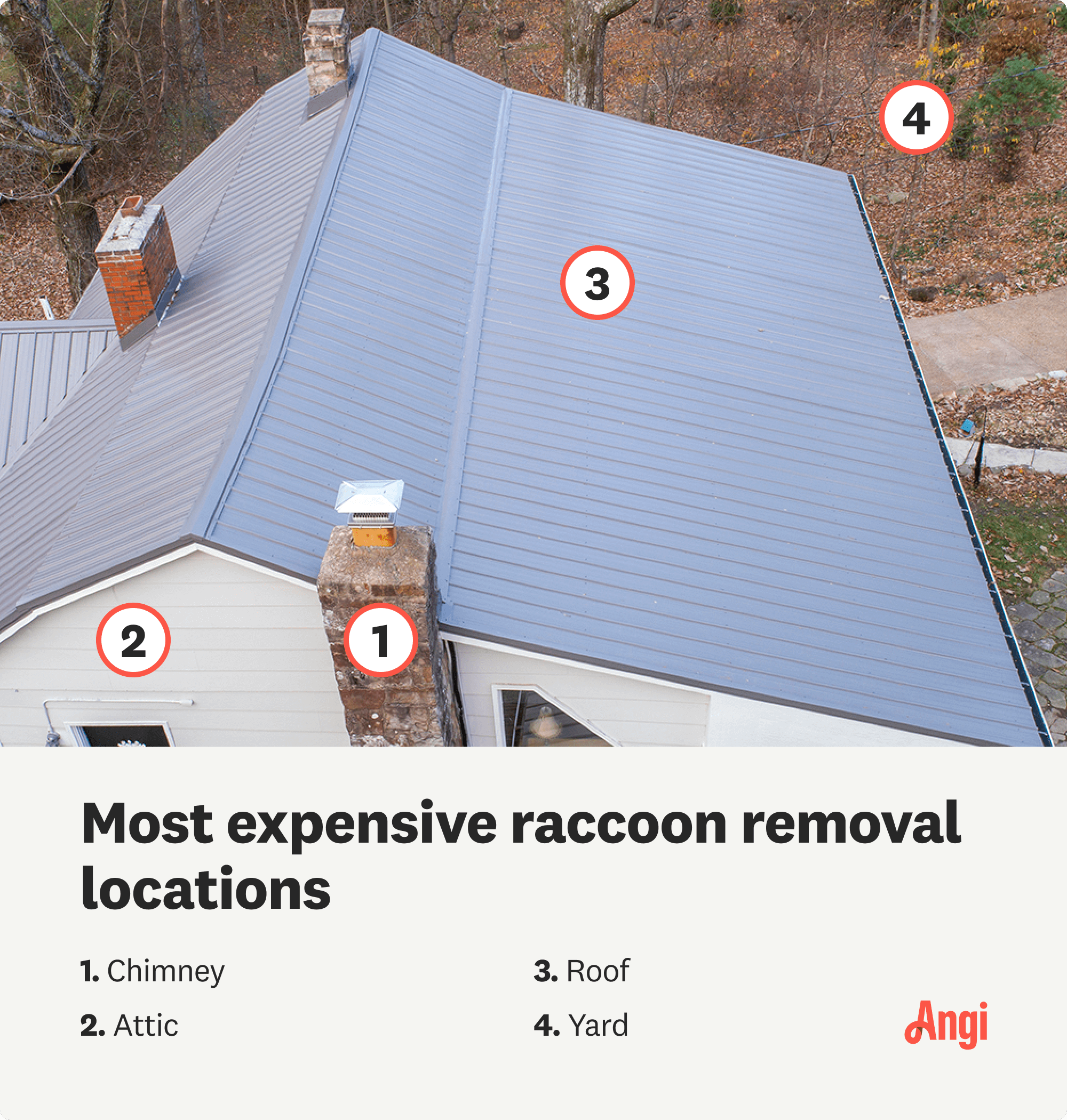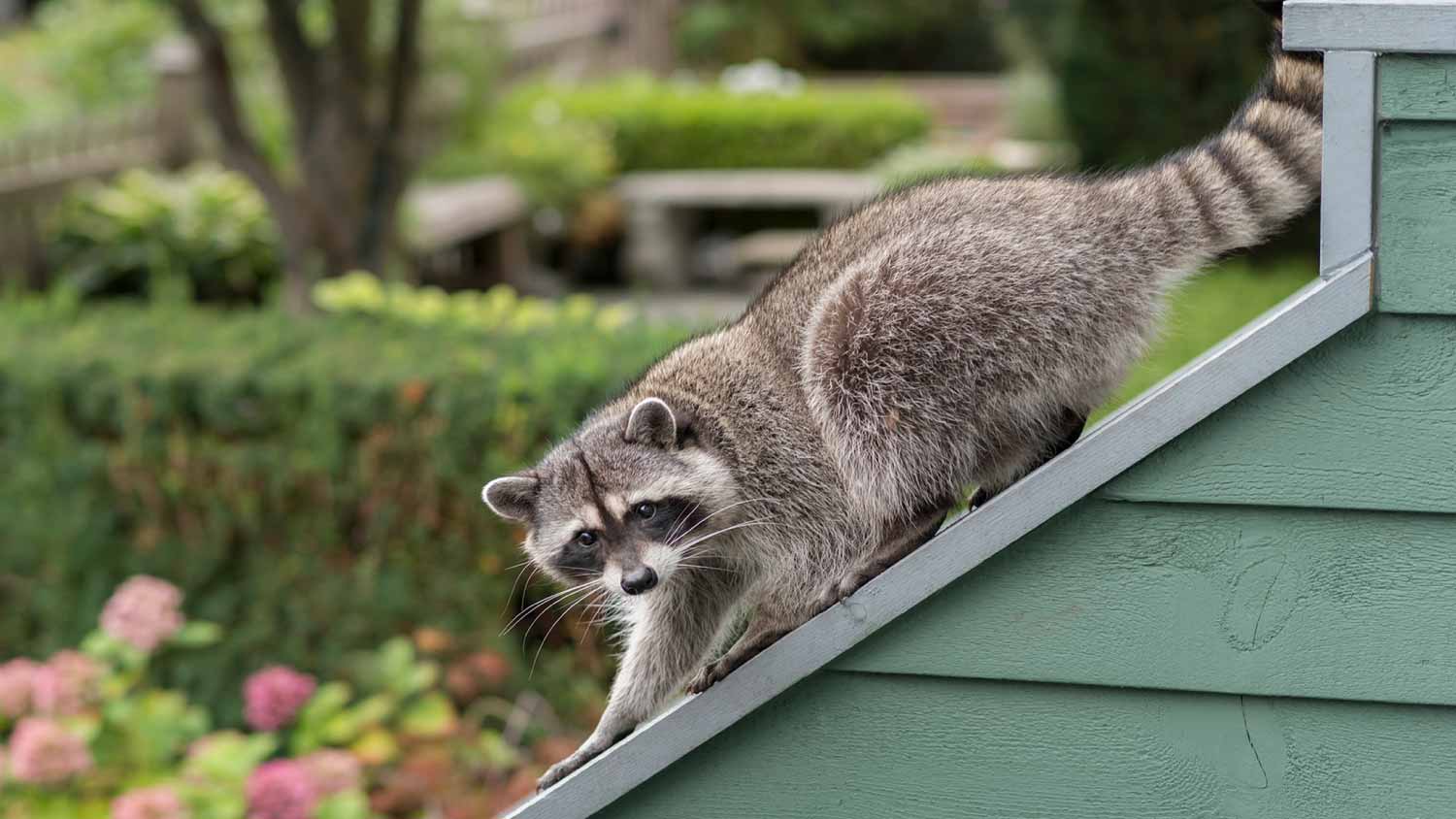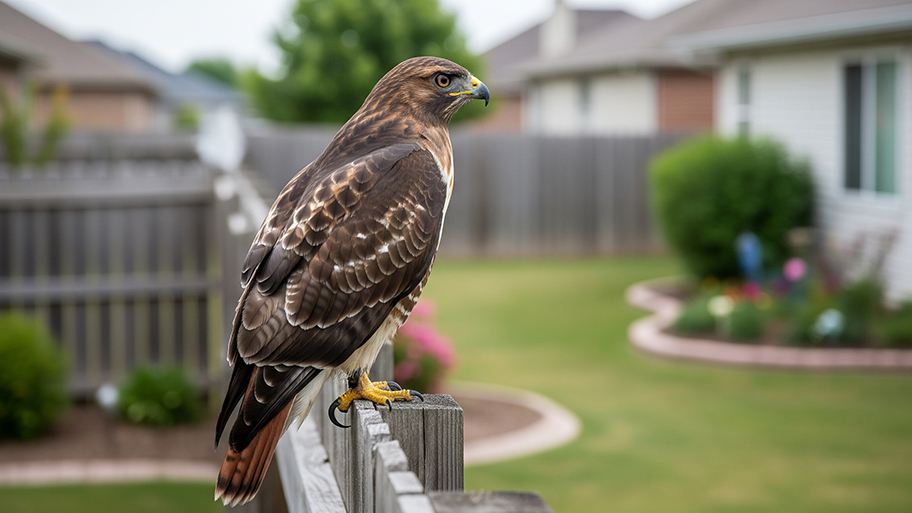
When calculating wildlife removal costs, you’ll need to consider the type, size, and amount of animals. Our guide will show you the wildlife removal cost.
The average raccoon removal costs about $400 but it can range from $300 to $450, depending on where the raccoons are and the methods used to remove them.


Trap and release is the most humane method for removing unwanted masked critters from your home and costs $150 to $300 per raccoon.
Removing raccoon nests costs between $300 and $750 per nest because it involves removing multiple raccoons.
More complex removal, such as from a chimney or an attic, can cost up to $3,500 because it takes more time and labor than removal from a yard.
On average, raccoon removal costs $400, though it may range anywhere from $150 to $1,900, depending on the severity of the problem, the raccoons’ location, and the methods used to remove them. Removing raccoons from inside an attic costs more, especially if a nest of offspring is involved.
Many potential factors can affect raccoon removal costs, including the following.
Most states require humane methods of raccoon removal. Methods such as poisoning are illegal due to the health risks involved.
Manual removal involves using a snare-catch pole and netting to catch small or young raccoons in indoor areas such as attics. The cost increases if the job involves a full nest of raccoons.
The most common and humane method of outdoor raccoon removal is trap and release. Raccoons are caught in live traps and relocated from your property safely.
| Removal Method | Average Cost |
|---|---|
| Manual removal (one raccoon) | $150–$250 |
| Trap and release (one raccoon) | $150–$300 |
| Manual removal (raccoon nest) | $300–$750 |
A single raccoon costs less to remove than an entire nest. The more raccoons you need to remove, the more complex and time-consuming the job.
| Infestation Size | Price Range |
|---|---|
| One raccoon | $150–$300 |
| Raccoon nest | $300–$725 |
Most pest removal services charge flat rates for different types of work. When you hire a raccoon removal company near you, expect a minimum of $150 to trap and remove a single raccoon over two visits: one to set up the trap and one to pick up and relocate the raccoon. If the trap captures another animal, additional visits to set up a new trap cost $250.
| Location | Average Cost |
|---|---|
| Yard | $150–$300 |
| Roof | $325–$700 |
| Chimney | $400–$3,500 |
| Attic | $550–$975 |
While trapping and removing an outdoor raccoon is fairly straightforward, removal becomes more complex when the raccoon is on or inside a building. Raccoons are commonly found nesting in attics, which comes with additional problems for removal specialists. For one, a litter of young raccoons won't respond to bait the way an adult will.
Plus, once you’ve removed all the raccoons, you must seal entrances to the attic. This typically involves climbing on the roof or hiring another pro to complete the work safely.

Calling an animal removal expert to inspect your property for raccoons can cost $80 to $150. Pros will often waive this fee if you hire them for removal afterward.
Expect to pay $150 to $350 to remove and dispose of a dead raccoon. Post-removal cleanup and sanitation of indoor areas can cost $250 to $500 and may include the removal of nests, feces, damaged insulation, and other debris.

The size of your infestation can lead to other costs, including ongoing removal efforts and repairs once the infestation is gone.
If you have a large raccoon infestation or animals continue to invade your home, you may pay for ongoing monitoring with multiple traps. On average, expect costs of $85 to $125 per animal.
If you have an indoor raccoon infestation in a location such as your attic, repairs may be necessary afterward. For example, raccoons can damage insulation or fall into gaps in walls.
If the latter happens, you'll need to cut through drywall to remove them before they die and decompose. Drywall repair costs at least $300. If raccoons damage your attic insulation, expect to pay insulation installation costs of $1 to $7 per square foot.
It’s best to consult the local raccoon control pros if you have a critter problem around your home to ensure your personal safety and prevent further damage to your property.
When dealing with raccoon removal, it’s best to hire professionals sooner rather than later.
Raccoons can be large and aggressive, and may have rabies. They are dangerous for homeowners to try to capture and remove by themselves.
Raccoon control professionals have the best capture techniques for raccoons and know where to place traps.
Experienced pest control companies that offer live capture know where to drop raccoons off afterward so returning coons are unlikely.
Serious raccoon problems often have a cause, from holes to a nearby source of food. The pros can identify those causes and recommend ways to handle them.
If you want to start with DIY steps before contact local raccoon control, there are several things to keep in mind:
Start with less-invasive treatment options that you can find in a home improvement store, like coyote urine sprays and similar barriers.
Don’t try to confront or chase away raccoons directly. If you need to remove raccoons, stick with traps that are specifically rated to handle them.
Seal up all access to trash and food around your property. Sometimes a new, locked trashcan can deter raccoons from showing up.
Seal up attics sheds while raccoons are away so they cannot gain entry again and will eventually look for somewhere else to spend time.
Consult local raccoon control services about their rates and availability for removing raccoons.
If raccoons are nesting inside your home, including the attic, consider escalating to emergency raccoon services to remove them ASAP.
Make sure raccoon control has full access to the areas where you’ve noticed raccoon activity during the home inspection.
Discuss with your pro options for repair or insulation services to control damage and prevent future raccoon entry.
Once raccoons have been safely removed from your property, your animal control pro may recommend sealing entrances to ensure they don't return. This can include installing animal-proof vents for $300 to $450 each or one-way metal mesh exclusion barriers for $10 to $25 per linear foot.
When you hire a general animal control service to remove a raccoon from your property, they may also offer other services that you can bundle with raccoon removal to reduce costs. Examples include:
Groundhog removal: $100 to $500
Squirrel removal: $200 to $600
Bat removal: $100 to $1,500
Check your local regulations before attempting to remove an animal. Some species may be protected or you may need a permit to relocate them.
The best way to save on raccoon removal is to prevent the need for removal in the first place. Raccoons have a strong sense of smell, so one way to keep them away is to apply scents they dislike around areas where they gather or nest.
Hot peppers
Garlic
Peppermint oil
Onion
Epsom salt
Repellents don’t always work, however. If you deal with removal year after year, you can pay an animal control company to inspect your property regularly as a preventative measure. This can cost about $50 per month or $200 per quarter, as opposed to the average $400 cost for a one-time visit.
Home is the most important place on earth, which is why Angi has helped more than 150 million homeowners transform their houses into homes they adore. To help homeowners with their next project, Angi provides readers with the most accurate cost data and upholds strict editorial standards. We survey real Angi customers about their project costs to develop the pricing data you see, so you can make the best decisions for you and your home. We pair this data with research from reputable sources, including the U.S. Bureau of Labor Statistics, academic journals, market studies, and interviews with industry experts—all to ensure our prices reflect real-world projects.
Want to help us improve our cost data? Send us a recent project quote to [email protected]. Quotes and personal information will not be shared publicly.
From average costs to expert advice, get all the answers you need to get your job done.

When calculating wildlife removal costs, you’ll need to consider the type, size, and amount of animals. Our guide will show you the wildlife removal cost.

Your skunk removal cost will depend on several factors, including type, location, and more. Our guide will cover everything you need to know about skunk removal costs.

When calculating fox removal costs, factor in whether you take a DIY approach or call in the pros, the number of animals involved, and the location.

Hawks are expert overhead hunters. To protect your pets and the little birds visiting your backyard, learn how to keep hawks away with these humane strategies.

Adopting a holistic approach to getting rid of rats naturally is a safe, effective, humane, and environmentally friendly way to rid yourself of these pests.

If you are wondering who to call for fox removal, wildlife control specialists are the best professionals to do the job safely, humanely, and legally.